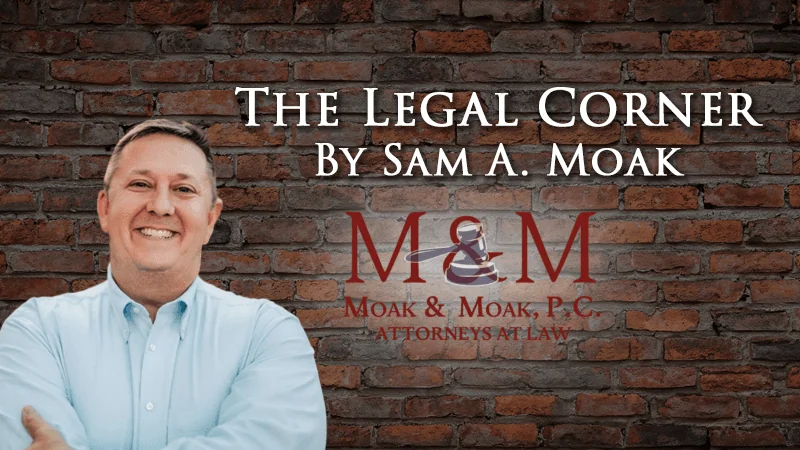The information in this column is not intended as legal advice but to provide a general understanding of the law. Some of the information in this column was prepared by the State Bar of Texas and is reprinted in this column with permission. Any readers with a legal problem, including those whose questions are addressed here, should consult an attorney for advice on their particular circumstances.
While I am an advocate for the use of a Power of Attorney to avoid guardianships, I realize there are times when a guardianship cannot be avoided. Therefore, in this week’s column I will address some of the more frequently asked questions regarding guardianships.
How does one go about initiating a guardianship?
Any interested party may file an application with the proper court requesting that a guardian be appointed for a person believed to be incapacitated.
What is the definition of an incapacitated person?
A person may be found to be incapacitated if due to a mental or physical condition he or she is unable to: (1) provide food, clothing, or shelter for himself or herself; (2) care for his or her own physical needs, or (3) manage his or her own financial affairs. A finding of incapacity will allow the person to be placed under guardianship. A minor person (someone under 18 years of age) and missing persons are also considered to be incapacitated.
Once a guardian is appointed, does the incapacitated person lose all rights and powers?
Not necessarily. A judge may appoint a guardian for an incapacitated person, but limit the guardian's powers so that all rights and powers except those granted to the guardian are retained by the incapacitated person.
Who may serve as guardian?
The court will appoint a guardian for an incapacitated person in the following order of priority: (1) the incapacitated person's spouse; (2) the person's nearest kin; and (3) an eligible person who is best qualified to serve.
The Judicial Branch Certification Commission (JBCC) oversees the certification Guardiansand the Registration of Guardianships throughout the State of Texas. In order to act as the guardian of a person, an individual must complete an online certification course. Additionally, attorneys who represent those making application to be a guardian must attend continuing legal education with the State Bar of Texas and provide proof they have been certified in that area.
Do the types of guardians vary?
Yes. Generally, there is a guardian of the person and a guardian of the estate. The guardian of the person has the duty and power to provide the incapacitated person with clothing, food, medical care, and shelter. The guardian of the estate has the duty and power to manage the incapacitated person's financial affairs. One person can fill both positions.
Who is not allowed to serve as guardian?
A person may not be appointed guardian if the person is a minor, a notoriously bad person, an incapacitated person, a person who is a party to a lawsuit affecting the incapacitated person (with some exceptions), a person who owed the incapacitated person money, unless it is repaid, a person with adverse claims to the incapacitated person or his property, an inexperienced or uneducated person, a person the court finds unsuitable, a person eliminated in a person's designation of guardian, or a nonresident without a resident agent.
Are there costs involved in a guardianship?
Yes. These costs include attorney's fees, filing fees, attorney ad litem fees, and bond premiums to be paid out of the incapacitated person's estate.
Is an alleged incapacitated person represented by an attorney?
Yes. When a guardianship is filed, the court appoints an attorney ad litem to represent the interests of the alleged incapacitated person. The person can also retain his or her own attorney.
What happens at a guardianship hearing?
The person who filed the application must prove the incapacity through testimony and medical evidence. The alleged incapacitated person has a right to bring his or her own witnesses to court and also the right to speak to the judge. The alleged incapacitated person may also request a jury trial. The judge or jury will determine if the person is incapacitated.
Upon appointment, how does a guardian qualify?
In addition to the JBCC certification mentioned earlier, the guardian must file an oath and post a bond in the amount set by the court to insure proper performance of his or her duties.
Does the guardian have reporting requirements to the court?
Yes. The guardian of the estate must file an inventory within 30 days of qualifying. The inventory must list all assets of the incapacitated person coming into the guardian's hands and all debts owed to the estate. The guardian of the estate must file an annual account to report all receipts and disbursements. The guardian of the person must file an annual report on the location, condition, and well-being of the incapacitated person.
What if there is an immediate need for the appointment of a guardian?
A temporary guardian can be appointed without notice to the proposed incapacitated person if his or her person or property is in imminent danger. Usually a temporary guardianship will not exceed sixty 60 days. However, if a permanent guardianship application has been filed and is contested or challenged, the court may appoint a temporary guardian to serve as temporary guardian until the contested guardianship action is resolved.
Pursuing a guardianship for a loved one can be an expensive and difficult process. An attorney can assist you in determining if a guardianship is appropriate for your particular situation. If you have further questions or are considering a guardianship for a loved one, you should consult your attorney.
Sam A. Moak is an attorney with the Huntsville law firm of Moak & Moak, P.C. He is licensed to practice in all fields of law by the Supreme Court of Texas, is a Member of the State Bar College, and is a member of the Real Estate, Probate and Trust Law Section of the State Bar of Texas. www.moakandmoak.com


